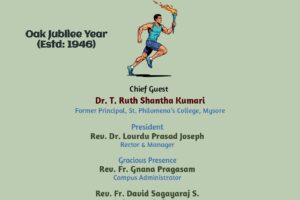Report on Experiential Learning Todas of Nilgiri Tamil Nadu
Every subject requires a field-based exposure to understand the reality beyond the walls of our classroom. Keeping this in mind, the teaching staffs and group of 20 students from the department of Political Science organized a study tour to Nilgiri hills in Ooty, Tamil Nadu on 30th July 2022. The main purpose of our visit was to study the Toda of Nilgiri hills. We had prior contacted Nilgiri Adivasi Welfare Association (NAWA), an NGO working for the welfare and development of the aboriginal people in the Nilgiri since from five decades for changing needs of tribal people and focusing on sustainable development


Smt.Vinoda and Sri Puspha Kumar the staff members of NAWA assisted and interacted with our team during our visit.
The Todas: An Introduction
The Todas are found only in the Nilgiri district and traditionally live in settlements consisting of three to seven small thatched houses, constructed in the shape of half-barrels and spread across the slopes of the pasture of an oval, pent-shaped called as Munds. Their huts symbolize rainbow shape with small doors supposedly to stop stray animals from entering them. Each Munds is not very far from the other and the location of each village is usually beside grassland for grazing buffaloes. There are many Toda villages like Teshteri, Patdu, Kakood, Oomgash, Pabalgore, Tarkosh. Osamanday. Among these villages we can find different clans being residing, and are been divide into endogamous and exogamous. Regarding their place of origin, the Todas insist that goddess Teikirshy and her brother on first created the buffalo by waving a magic wand, and then created the Toda man. The first Toda woman was created from the right rib of the man and they were oldest inhabitants in the Nilgiris. They speak Toda language of Dravidian origin but has no script and these people are well versed in Tamil and Kannada also. In 2000, there were 56 occupied Toda munds, 19 households per mund with a population around 1500.
Field Experience:
Smt. Vinoda accompanied us throughout the visit firstly she took the team to Muthnad mund it is a Todas settlement consisting of nearly 15 households. The Todas women welcomed the team heartily and were very interactive throughout the visit. We were taken to their holy temple and this place is considered to be very sacred. The priest explained every year on the auspicious day all the Todas men visit this temple to seek the blessings of the god. Many of the Todas maintain that they worship the buffalo as a deity and they distinguish buffalo’s breed of long-horned buffaloes and exalt their status. Buffalos’ ghee is considered to be the most sacred in all their rituals and ceremonies. Every mundh of Todas have a temple protecting their villages, the horns of different animals, sacred pots are kept as deities inside the temple. The buffalo face is drawn at the entrance of the temple and hold the lamp or the sacred buffalo horn. Women folk are not permitted to enter the temple. Among Todas there is no caste distinction, any male can become the holy milk man (priest) but there are some restrictions that have to be followed by him. First very important is that he should have his own buffalo to lid the lamp from buffalo ghee only.

Temple of Todas
That day will be like a fair all the Todas settlement throughout Nilgiris come here to celebrate this day and it will be like a get together. The priest explained about the taboos they have that has to be strictly followed in the community. Later some of the Toda women came dressed up in their traditional attire sang and danced for the Todas songs which is the highlight of their culture. They also explained the meaning of the songs which expresses about the beauty of the nature and their role in protecting it.
The students also joined and danced with the Todas and that was a wonderful moment to all of us. Later the students along with the teachers interacted with the Toda women highlighting about their livelihood options and other aspects of their life. Regarding marriage and family, the members shared that Todas once practiced fraternal polyandry, a practice in which a woman marries all the brothers of a family; this was due to the lack of female population. But in recent years monogamy is been encouraged and practiced. The suitor has to prove his worth to the girl’s family by lifting a heavy stone to his shoulders. The marriage ceremony itself is a celebrated event among all Todas. The members of the clan assemble at a customary place, mostly a tree. A group of settlements of clans might regard a single tree as their place of marriage. The particular tree has a hole which is made to accommodate the lamp, which has a very important role in rituals. During the marriage husband has to present a buffalo and one rupee coin as token of respect. When the girl is pregnant, we come across the ‘bow and arrow’ ceremony in which the girl is presented with the bow and the arrow. This particular rite may suggest an aspiration for a brave boy. This ceremony confirms the clan of the baby. Many of the Toda ceremonies involve an odd number of men. The purification chants are recited 7 times, while other chants are recited 3 times. The members also showed the album of their marriage and sacred bow and arrow ceremony.
Todas have their own traditional dress. It consists of a single piece of cloth, which is worn like the plaid of a Scottish highlander over a dhoti for men and skirt for women. They wrap themselves with an embroidery shawl with different colors. Each color has significance like cream color indicates Infant, red for adolescence and black for maturity. Women have very unique hairstyles with elegant jewels. The Todas are vegetarians. Buffalo milk is made into butter, butter milk, yogurt, and cheese drunk plain. Rice is mainly eaten and is eaten with dairy products and curries.

Political Life of Todas:
Todas are very active in their political life as they enjoy all the political rights guaranteed by the Constitution of India. Every individual who has attained the age of 18 possess voter ID Card and participate in voting and few contest in election too.
Changing lifestyle of the Todas:
Everything is a subject to change which is nature’s law and true among Todas also. The forced interaction with civilization has caused a lot of changes in the tradition, culture and lifestyle of the Todas. After the discussion and interaction following are some of the changes among Todas was observed.
Some of the changes can be noted below:
- The Todas used to be a pastoral people but are now increasingly venturing into agriculture and other occupations for their livelihood.
- Todas used to be strict vegetarians but some can be now be seen eating non-vegetarian food.
- Todas have abandoned their traditional houses (Rainbow) and switched for concrete houses.
- Todas sacred dairies are been renovated.
- Though Todas were patriarchal the post Todas in the 21st century women play a vital role in all aspects and has greater liberty.
- Todas are practicing monogamy.
- Education is been promoted; migration is increasing.
- They are been supported by government Welfare Programme and also by NGOs.
- Due to shortage of grazing land cattle rearing is decreasing.
- Their dressing style is changed, on special occasions they wear their traditional clothes.
- Todas are been influenced with modern entertainment like T.V., radio, Mobile phones and there by losing their old ways of traditional songs and dance.
- Many of the Todas are doing petty business for their livelihood
- Most of the women do their traditional embroidery Shawls, bags and hand purses and it is marketed.

The wave of modernity has certainly led to the changes of Todas life style, there is a fear among Todas due to land encroachment as it is been converting into tourist spot. Some of the community members are still trying to preserve their culture and transmit it to their younger generation. Todas want to keep their sanctity; they don’t want to lose their land any more. Since from the past, they are the contributors to the beautiful Nilgiri hills and they don’t want to do business with nature. Todas are nature lovers and it’s our wish that they should not be disturbed.
Overall, the visit was very fruitful, the students were able to understand the Todas beliefs, practices and also the changes and trends among them. The team received a very good hospitality and it was very interactive throughout the visit.



